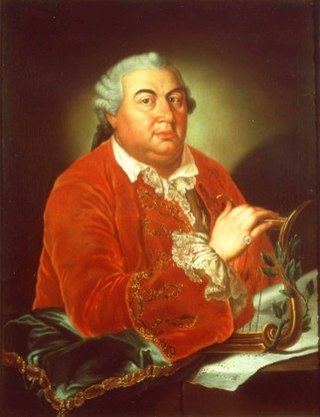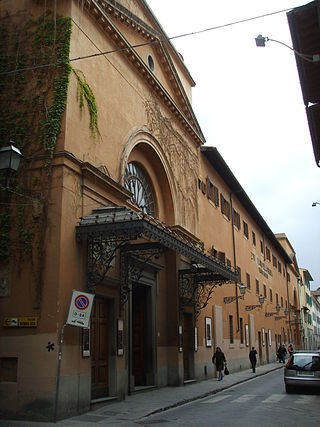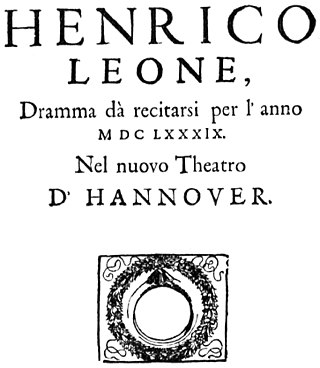Related Research Articles

Niccolò Jommelli was an Italian composer of the Neapolitan School. Along with other composers mainly in the Holy Roman Empire and France, he was responsible for certain operatic reforms including reducing ornateness of style and the primacy of star singers somewhat.

Giovanni Bononcini was an Italian Baroque composer, cellist, singer and teacher, one of a family of string players and composers. He was a rival to George Frederic Handel.

Agostino Steffani was an Italian bishop, polymath, diplomat and composer.

Sophia Charlotte of Hanover was the first Queen consort in Prussia as the wife of King Frederick I. She was the only daughter of Elector Ernest Augustus of Hanover and Sophia of the Palatinate. Her eldest brother, George Louis, succeeded to the British throne in 1714 as King George I.
The year 1654 in music involved some significant events.

Carlo Francesco Pollarolo was an Italian composer, organist, and music director. Known chiefly for his operas, he wrote a total of 85 of them as well as 13 oratorios. His compositional style was initially indebted to the opera tradition of Giovanni Legrenzi and Carlo Pallavicino, but he moved beyond this style with innovations to the compositional structure of the aria characterized by expanded forms and orchestral elaborations. His early work used three part strings in the Legrenzi and Pallacino tradition of orchestration, but his mid and later works had developed into a richer orchestration of five strings parts and expanded instrumentation of brass and woodwinds. He was the first Venetian opera composer and one of the earliest Italian composers to use the oboe in his opera orchestrations.
The following is the Jacobite line of succession to the English and Scottish thrones as of the death of Anne, Queen of Great Britain, on 1 August 1714. It reflects the laws current in England and Scotland immediately before the Act of Settlement 1701, which disqualified Catholics from the throne.

Giuseppe Maria Orlandini was an Italian baroque composer particularly known for his more than 40 operas and intermezzos. Highly regarded by music historians of his day like Francesco Saverio Quadrio, Jean-Benjamin de La Borde and Charles Burney, Orlandini, along with Vivaldi, is considered one of the major creators of the new style of opera that dominated the second decade of the 18th century.

Antonio Salvi was an Italian physician, court poet and librettist, active mainly in Florence, Italy. He was in the service of the grand-ducal court of Tuscany and the favourite librettist of Prince Ferdinando de' Medici. Salvi was one of the developers of the opera seria.
Silvio Stampiglia was an Italian poet, librettist, and founder member of the Accademia dell'Arcadia under the pen name of Palemone Licurio. Numerous Italian composers set his libretti to music, particularly Carlo Agostino Badia and Giovanni Bononcini.
Elisabetta Pilotti-Schiavonetti was an Italian operatic soprano who was associated with the House of Hanover. She was one of the leading prima donnas at the Queen's Theatre in the Haymarket from 1710 to 1717. She is best remembered today for creating roles in at least four operas by George Frideric Handel, possibly five. Three of the roles that Handel wrote specifically for her were sorceresses, and the demands of those roles indicate that she possessed an exceptional voice capable of both dramatic power and technical agility. She is said to have had a bitter rivalry with the Queen's other leading soprano, Isabella Girardeau.
Albert Wolfgang, Count of Hohenlohe-Langenburg was the oldest child of Count Henry Frederick of Hohenlohe-Langenburg (1625–1699) and his second wife Countess Juliana Dorothea of Castell-Remlingen (1640–1706).
Quirino Colombani was an Italian composer, and cellist. He was active in both 17th and 18th centuries.

Henrico Leone is an opera in three acts composed by Agostino Steffani to an Italian libretto by Ortensio Mauro. Based on the life of the powerful German prince Henry the Lion, the opera was first performed on 30 January 1689 in Hannover to inaugurate the new royal theatre in the Leineschloss.

(Bartolomeo) Ortensio Mauro was an Italian writer and librettist.
Giovanni Filippo Apolloni was an Italian poet and librettist. Born in Arezzo, he has sometimes been referred to as "Giovanni Apollonio Apolloni", but the second given name is spurious. He served as the court poet to Ferdinand Charles, Archduke of Austria at Innsbruck form 1653 until 1659. On his return to Italy he entered the service of Cardinal Volumnio Bandinelli. After Bandinelli's death in 1667 Appolloni was in the service of the Chigi family in Rome and Siena for the rest of his life. He wrote the librettos for a number of operas, the most well-known of which were Antonio Cesti's L'Argia and La Dori, as well as several oratorios and the texts for cantatas by both Cesti and Alessandro Stradella.
Maria Landini was an Italian soprano who began her career as a singer at the court of Queen Christina in Rome but was primarily active at the imperial court in Vienna from 1711 until her death. She created numerous soprano roles in operas and oratorios by Fux, Caldara, and her second husband, Francesco Bartolomeo Conti and was reputedly the highest paid musician in Vienna at the time.
Orlando generoso is an opera of Agostino Steffani composed to a libretto by Ortensio Mauro after Ariosto's Orlando furioso. The opera was written in 1691, Steffani's fourth for the Duchy of Hanover. The opera was presented again in Hanover in 1692, and in 1695 it was performed at the Oper am Gänsemarkt in Hamburg.
References
- 1 2 3 Crescimbeni, Giovanni Mario. Notizie Istoriche degli Arcadi Morti, Volume 2, pp 129–133
- ↑ Luppi, Andrea. Lo specchio dell'armonia universale: estetica e musica in Leibniz. Franco Angeli, 1989. ISBN 9788820435455, p. 31
- ↑ Duggan, J.N. Sophia Of Hanover: From Winter Princess to Heiress of Great Britain, 1630 – 1714. Sophia of Hanover to Leibniz (15 October 1701): "I was very grieved by the death of the Count Palmieri."
- ↑ Bungies, Wolfgang (ed) Leibniz, Gottfried Wilhelm: Sämtliche Schriften und Briefe. [Complete Writings and Correspondence], BAND 12 November 1695 – Juli 1696 November 1695 – Juli 1696. A letter from Leibniz to Count Palmieri (12 November 1695).
- ↑ Timms, Colin Ronald. The Chamber Duets of Agostino Steffani (1654–1728), with Transcriptions and Catalogue. Dissertation submitted for the degree of Doctor of Philosophy in the Faculty of Music. University of London King's College, 1976, p. 49.